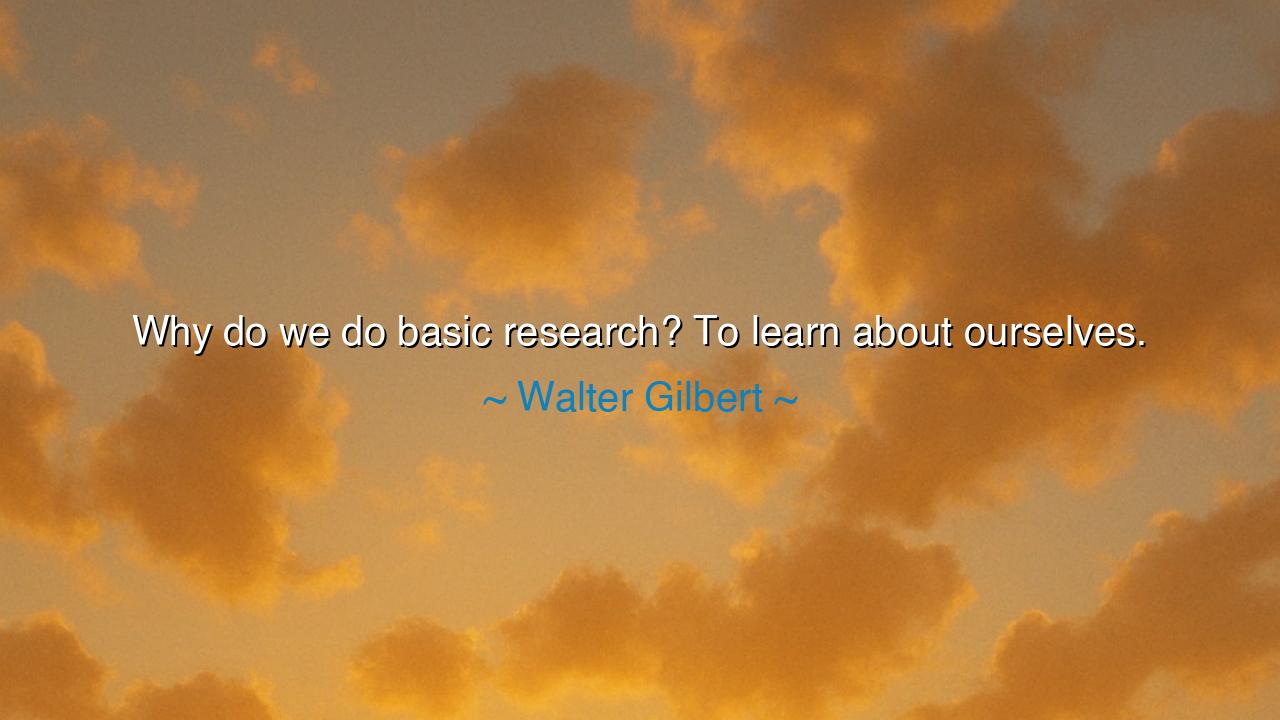
Why do we do basic research? To learn about ourselves.






"Why do we do basic research? To learn about ourselves." These words, spoken by the esteemed Walter Gilbert, strike at the very heart of the human endeavor. In this simple yet profound statement, Gilbert unveils the true purpose of scientific inquiry—not simply to uncover facts about the world around us, but to reveal the deeper truths about our own nature. Basic research, which often seems distant and abstract, is not just an intellectual pursuit; it is a journey into the very soul of humanity, a quest to understand the forces that shape us, drive us, and make us who we are. To know the world is, in essence, to know ourselves.
The ancients, too, understood this deep connection between the pursuit of knowledge and the exploration of the self. In ancient Greece, Socrates famously declared, "Know thyself," urging individuals to seek wisdom, not just in the world around them, but in the innermost recesses of their own being. The journey of philosophy was not a search for external truths alone, but a quest for self-awareness, for understanding one’s own nature, desires, and limitations. This call to self-exploration is mirrored in the very essence of basic research—whether in the realms of biology, physics, or psychology, we are constantly driven by a deep, primal need to understand the forces that govern not just the world, but our place within it.
Consider the transformative work of Charles Darwin and his theory of evolution. His groundbreaking research into the natural world did not simply aim to catalog species or explain the origins of life; it sought to uncover the very nature of humanity’s place in the great chain of life. Darwin’s work taught us that we, too, are part of a vast, interconnected web of life, shaped by the same forces that govern every living being. Through his study of the natural world, Darwin uncovered profound truths about human nature, about our origins, and about our deep connection to the earth. In this way, Darwin’s research was not just about understanding the world—it was about understanding ourselves, our origins, and our place in the grand tapestry of life.
Gilbert’s words also call to mind the scientific revolution that took place in the 16th and 17th centuries. Think of Galileo, whose observations of the heavens did not simply seek to explain celestial bodies, but to expand our understanding of humanity’s role in the cosmos. His discoveries, though revolutionary, were not solely about the stars and planets—they were a profound reflection of the human desire to know, to understand not just the external world, but the very fabric of existence itself. Galileo’s work was a search for truth, but also for identity—for an understanding of humanity’s place in a universe far greater than what was previously imagined. Like Gilbert’s call for basic research, Galileo’s discoveries were an invitation to explore the depths of the self through the lens of the world.
And yet, basic research often delves into areas that seem distant from our everyday lives—into the microscopic, the theoretical, the unknown. But here lies the beauty and the wisdom of Gilbert’s insight: that through the study of fundamental questions—whether in genetics, chemistry, or quantum physics—we gain insights not only into the structure of the universe, but into the very fabric of human existence. The discovery of the DNA double helix by James Watson, Francis Crick, and Maurice Wilkins opened the door to understanding the biological foundation of life itself. But more than that, it unlocked the story of humanity—our shared inheritance, our vulnerabilities, and our potential. In understanding our genetic code, we come to understand not just our biology, but the essence of what makes us human.
So, why do we do basic research? We do it, as Gilbert so eloquently puts it, to learn about ourselves—to explore the deepest mysteries of our being. Whether through the lens of science, art, or philosophy, the pursuit of knowledge is, at its core, a journey to discover the truths that lie within. In each experiment, each hypothesis, each theory, we are not just uncovering the hidden workings of the world; we are uncovering the deeper truths of our own nature. Basic research becomes an act of self-exploration, an unfolding of the mysteries of life, not merely as they exist in the world around us, but as they manifest within us.
The lesson for us, then, is this: seek knowledge, not only for the sake of understanding the world, but for the sake of understanding yourself. Whether in your work, your relationships, or your personal growth, approach each endeavor as a form of research, a way to explore the deeper questions that lie within. Just as science seeks to uncover the secrets of the universe, so too can we seek to uncover the secrets of our own hearts, minds, and souls. In doing so, we come to a deeper understanding of the self, and, in turn, a deeper connection to the world.
In your own life, ask yourself: What are the questions that you seek to answer? What is it that you wish to understand, not just about the world, but about your place in it? Take the time to reflect on the deeper truths that science, philosophy, and life can reveal about who you are. The pursuit of knowledge, whether through formal research or the everyday study of life, is a path that leads to self-awareness, and through that awareness, we come closer to understanding not just the world, but our very essence as human beings. This, then, is the highest calling of all: to learn about ourselves, to discover who we truly are, and through that discovery, to contribute to the greater understanding of humanity as a whole.






AAdministratorAdministrator
Welcome, honored guests. Please leave a comment, we will respond soon